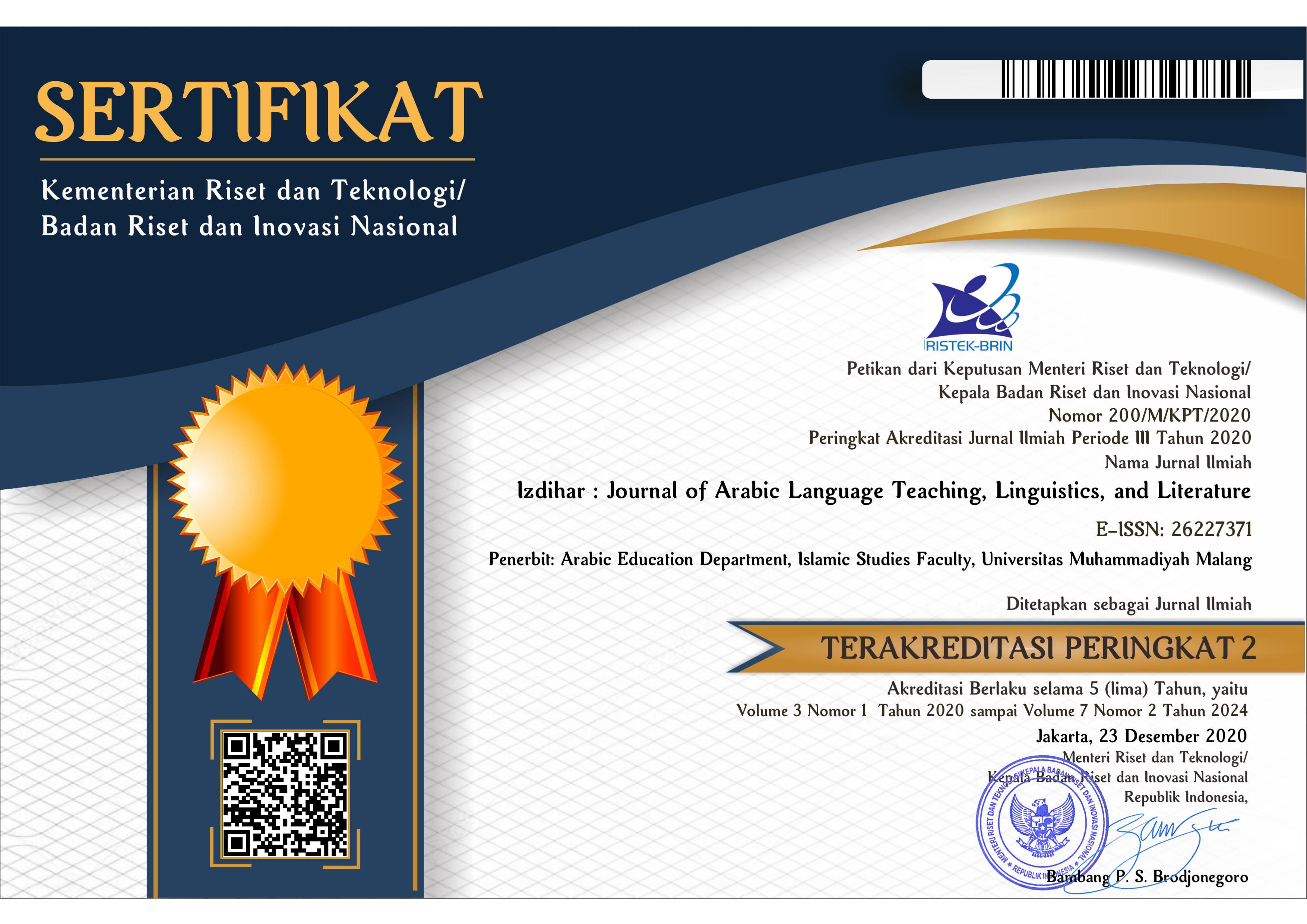The Quizizz Application is an Arabic Online Learning Evaluation Tool at The University Level
DOI:
https://doi.org/10.22219/jiz.v5i1.20647Keywords:
Learning Evaluation, Quizizz, Strategy and implementation., Learning Evaluation; Implementation; Strategy;QuizizzAbstract
The purpose of this study was to show how to use Quizizz-based psycholinguistic evaluation in a learning evaluation and to assess its effectiveness. This study used a qualitative descriptive case study approach, which resulted in descriptive data in the form of written or spoken statements from the participants and observations of their behavior. Thus, direct interviews with students of Independent Campus Freedom To Learn are one of the data collection strategies. According to the findings of the questionnaire and interview distribution, 89 percent of respondents claimed that this evaluation was not dull but provided a lot of diversity, even if 14.3 percent said they utilized Quizizz because it didn't support the signal. Furthermore, 100% of respondents thought the learning evaluation method was not dull or monotonous. These findings suggest that Quizizz-based evaluation is a lot of fun and doesn't get boring in the classroom, and it gets students excited about learning.
Downloads
References
Abd Wahab Rosyidi & Mamlu’atul Ni’mah. (2011). Memahami konsep dasar pembelajaran bahasa Arab. UIN Maliki Press
Aini, Y. I. (2019). Pemanfaatan media pembelajaran quizizz untuk pembelajaran jenjang pendidikan dasar dan menengah di Bengkulu. Jurnal Kependidikan 2(25). 1–6. http://jurnal.umb.ac.id/index.php/kependidikan/article/view/567
Bahruddin, U., Ramadhan, M. F., Halomoan, H., Alzitawi, D. U. D. M., & Hamid, M. A. (2021). The quality improvement of the interaction indicators of the Arabic language learning in higher education. Izdihar: Journal of Arabic Language Teaching, Linguistics, and Literature, 4(1), 59-70. https://doi.org/10.22219/jiz.v4i1.15919
Candra Rolisca, R. U., & Achadiyah, B. N. (2014). Pengembangan Media Evaluasi Pembelajaran Dalam Bentuk Online Berbasis E-Learning Menggunakan Software Wondershare Quiz Creator Dalam Mata Pelajaran Akuntansi Sma Brawijaya Smart School (Bss). Jurnal Pendidikan Akuntansi Indonesia, 12(2). https://doi.org/10.21831/jpai.v12i2.2706
Ch, H. (2020). Analysis of the need for quizizz-based nahwu learning application model in Arabic education study program, state university Jakarta. Journal International Seminar on Languages, Literature, Arts, and Education (ISLLAE), 2(2), 109-122. https://doi.org/10.21009/ISLLAE.02209
Fiani, I. N., Ahsanuddin, M., & Morhi, R. (2021). The Effectiveness of Using Kahoot! Application as An Evaluation Tool in Arabic Vocabulary Learning at Madrasah Ibtidaiyah. Izdihar: Journal of Arabic Language Teaching, Linguistics, and Literature, 4(2), 243-256. https://doi.org/10.22219/jiz.v4i2.17186
Liza, F., Rachmawati, M., & Shahrour, A. (2021). Fun Learning Arabic Speaking Skills Using Kinemaster Video. Izdihar: Journal of Arabic Language Teaching, Linguistics, and Literature, 4(3), 363-372. https://doi.org/10.22219/jiz.v4i3.17851
Haryudin, A., & Imanullah, F. (2021). The utilization of kinemaster applications in the making of multimedia based teaching materials for english e-learning in new normal (Covid-19). PROJECT (Professional Journal of English Education), 4(2), 341. https://doi.org/10.22460/project.v4i2.p341-352
Hasan, H. (2018). Psikolinguistik: Urgensi dan manfaatnya pada program studi pendidikan bahasa Arab. Al Mi'yar: Jurnal Ilmiah Pembelajaran Bahasa Arab dan Kebahasaaraban, 1(2), 1-18. https://doi.org/10.35931/am.v1i2.41
Hendri, M. (2017). Pembelajaran keterampilan berbicara bahasa Arab melalui pendekatan komunkatif. POTENSIA: Jurnal Kependidikan Islam, 3(2), 196-210. https://doi.org/10.24014/potensia.v3i2.3929
Hidayat, H., Hartono, H., & Sukiman, S. (2017). Pengembangan Learning Management System (LMS) untuk Bahasa Pemrograman PHP. Jurnal Ilmiah Core IT: Community Research Information Technology, 5(1). 20-29. http://www.ijcoreit.org/index.php/coreit/article/viewFile/11/11
Ismail, M. (2013). Peranan psikolinguistik dalam pembelajaran bahasa Arab. At-Ta'dib, 8(2).281–297. http://dx.doi.org/10.21111/at-tadib.v8i2.508
Kalahatu, M. F. (2021). Persepsi peserta pelatihan dasar terhadap penggunaan quizizz sebagai metode evaluasi pembelajaran. Akademika: Jurnal Teknologi Pendidikan, 10(01), 163-178. https://doi.org/10.34005/akademika.v10i01.1228
Rahayu, M. K. P. (2018). Peta penggunaan e-learning oleh dosen fakultas ekonomi dan bisnis pasca hibah spada. Jurnal Manajemen Bisnis, 9(2), 175-192. https://doi.org/10.18196/mb.9264
Rachmawati, M., Nugrahaeni, F., & Mauludiyah, L. (2020). Improving Arabic speaking skill through mind mapping strategy. Izdihar: Journal of Arabic Language Teaching, Linguistics, and Literature, 3(1), 31-44. https://doi.org/10.22219/jiz.v3i1.10967
Mulyadi, M. (2011). Penelitian kuantitatif dan kualitatif serta pemikiran dasar menggabungkannya. Jurnal studi komunikasi dan media, 15(1), 128-137. https://doi.org/10.31445/jskm.2011.150106
Muradi, A. (2018). Pemerolehan bahasa dalam perspektif psikolinguistik dan Alquran. Jurnal Tarbiyah : Jurnal Ilmiah Kependidikan, 7(2). https://doi.org/10.18592/tarbiyah.v7i2.2245
Natsir, N. (2017). Hubungan psikolinguistik dalam pemerolehan dan pembelajaran bahasa. RETORIKA: Jurnal Bahasa, Sastra, dan Pengajarannya, 10(1). 20–29. https://doi.org/10.26858/retorika.v10i1.4610
Rahman, N. F., Dakhoir, A., Hasan, A. M., Ihsani, H. N., & Khair, N. (2021). Web based assessment alternative for Arabic online exam. Izdihar: Journal of Arabic Language Teaching, Linguistics, and Literature, 4(2), 179-194. https://doi.org/10.22219/jiz.v4i2.16525
Setemen, K. (2010). Pengembangan evaluasi pembelajaran online. Jurnal Pendidikan dan pengajaran, 43(3). 207–214. https://doi.org/10.23887/jppundiksha.v43i3.124
Setiadi, F. M. (2020). Pendekatan Psikolinguistik bahasa arab di Indonesia. Ihya Al-Arabiyah: Jurnal Pendidikan Bahasa Dan Sastra Arab, 6(1), 57-68. http://jurnal.uinsu.ac.id/index.php/ihya/article/view/7746
Setiyawan, A. (2014). Mudzakkar dan Muannats: Sumber Pendidikan Islam Bias Gender. Jurnal Pendidikan Islam, 3(2), 245-266. https://doi.org/10.14421/jpi.2014.32.245-266
Noor, S. (2020). Penggunaan quizizz dalam penilaian pembelajaran pada materi ruang lingkup biologi untuk meningkatkan hasil belajar siswa kelas X. 6 SMAN 7 Banjarmasin. Jurnal Pendidikan Hayati, 6(1), 1-7. https://doi.org/10.33654/jph.v1i1.927
Suhartono. (2015). Psikolinguistik dan Perkembangannya. Universitas Terbuka
Tanuwijaya, N. S., & Tambunan, W. (2021). Alternatif solusi model pembelajaran untuk mengatasi resiko penurunan capaian belajar dalam pembelajaran tatap muka terbatas di masa pandemic covid 19. Jurnal Manajemen Pendidikan, 10(2), 80-90. https://doi.org/10.33541/jmp.v10i2.3272
Fauzia, V. R., Nursyamsiah, N., & Sopian, A. (2021). The use of media learning quizizz in vocabulary Arabic language. In International Conference on Arabic Language and Literature. 134-139.http://proceedings2.upi.edu/index.php/ical/index
Walidah, Z., Yanuar, M., Azizah, D. N., & Qalyubi, S. (2020). Stylistic Analysis in Surah Al-Najm. Izdihar: Journal of Arabic Language Teaching, Linguistics, and Literature, 3(2), 129-146. https://doi.org/10.22219/jiz.v3i2.11624
Yusuf, M. (2019). Psikolinguistik Dalam Metodologi Pembelajaran Bahasa Arab Di Era Postmetode. Al Mi’yar: Jurnal Ilmiah Pembelajaran Bahasa Arab Dan Kebahasaaraban, 2(2), 183. https://doi.org/10.35931/am.v2i2.123
Sya’bani, M. Z. (2019). Analisis Kemampuan Mengubah Pronomina (Isim Dhomir) Mahasiswa Semester IB Akhwat STIT Darul Fattah Bandar Lampung. An Naba, 2(2), 10-20. https://doi.org/10.2512/annaba.v2i2.27
Downloads
Published
How to Cite
Issue
Section
License
Copyright (c) 2022 Miatin Rachmawati mia, Ahmad Rizki, Izdihar : Journal of Arabic Language Teaching, Linguistics, and Literature Nugrahawan, Nurul Hidayati Rofi’ah

This work is licensed under a Creative Commons Attribution-ShareAlike 4.0 International License.
Copyright Notice
Authors who publish with this journal agree to the following terms:
- Authors retain copyright and grant the journal right of first publication with the work simultaneously licensed under a Creative Commons Attribution-ShareAlike 4.0 International License that allows others to share the work with an acknowledgment of the work's authorship and initial publication in this journal.
- Authors are able to enter into separate, additional contractual arrangements for the non-exclusive distribution of the journal's published version of the work (e.g., post it to an institutional repository or publish it in a book), with an acknowledgment of its initial publication in this journal.
- Authors are permitted and encouraged to post their work online (e.g., in institutional repositories or on their website) prior to and during the submission process, as it can lead to productive exchanges, as well as earlier and greater citation of published work (See The Effect of Open Access).
Copyright (c) 2019 Izdihar : Journal of Arabic Language Teaching, Linguistics, and Literature

This work is licensed under a Creative Commons Attribution-ShareAlike 4.0 International License.

















